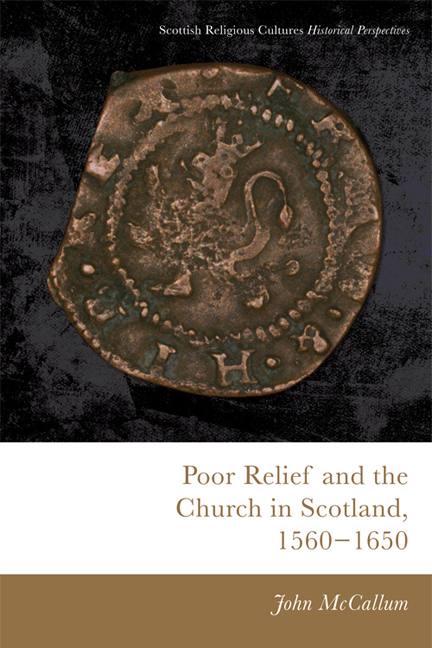Book contents
- Frontmatter
- Contents
- List of Tables
- Acknowledgements
- Conventions
- Abbreviations
- Map of Key Locations Mentioned
- Introduction
- 1 Ideas, Attitudes and Ambitions
- Part I The Development of Kirk Session Poor Relief
- Part II The Nature of Kirk Session Poor Relief
- 5 The Mechanics of Relief
- 6 Who Were the Poor? The Recipients of Relief
- 7 Who Was Deserving? Decision-making and Discrimination
- 8 Beyond the Kirk Session: Mixed Economies of Relief
- Conclusion
- Appendix Equivalent Values from Wages and Prices
- Bibliography
- Index
8 - Beyond the Kirk Session: Mixed Economies of Relief
from Part II - The Nature of Kirk Session Poor Relief
Published online by Cambridge University Press: 14 September 2018
- Frontmatter
- Contents
- List of Tables
- Acknowledgements
- Conventions
- Abbreviations
- Map of Key Locations Mentioned
- Introduction
- 1 Ideas, Attitudes and Ambitions
- Part I The Development of Kirk Session Poor Relief
- Part II The Nature of Kirk Session Poor Relief
- 5 The Mechanics of Relief
- 6 Who Were the Poor? The Recipients of Relief
- 7 Who Was Deserving? Decision-making and Discrimination
- 8 Beyond the Kirk Session: Mixed Economies of Relief
- Conclusion
- Appendix Equivalent Values from Wages and Prices
- Bibliography
- Index
Summary
Introduction
The church was the main provider of poor relief in early modern Scotland. Previous chapters in this book have explored its fundraising, distribution, and approaches to the poor in detail. However, as numerous studies in the history of pre-modern poverty and welfare have taught us, it is important to avoid focusing too narrowly on single, dominant institutional relief providers at the expense of wider and more diverse ecologies of relief. This is a significant consideration in opening up the study of Scottish relief because other actors, including institutions and individuals, provided relief to the poor. The study of their activities can contextualise the kirk sessions’ work and also allow us to observe how other sources and forms of relief might have worked with and alongside the church's provision. Furthermore, building on recent claims that formal institutional relief was only a part of the picture, it is essential to pay attention to the more informal help that was given, as well as attempting to flip the perspective to that of the poor themselves, in order to reflect on their survival strategies. In considering the wider context of relief beyond the kirk session, this chapter focuses on three broad themes: relief and regulation of the poor by institutions (mainly urban) other than the church; private philanthropy and official charitable giving by individuals; and assistance within the community and self-help strategies employed by the poor. These should certainly not be seen as mutually exclusive or independent spheres – indeed as we shall see there were important ways in which these avenues of support co-operated and overlapped.
Other Institutions
Secular Authorities
The kirk session was not the only local authority that took an interest in the welfare and lives of the poor in early modern Scotland. Kirk sessions were the principal relief providers, and in rural parishes the only authority to organise formal relief during this period. However, secular authorities in towns also had a role to play; their membership often overlapped with the kirk session, of course, but they were significant institutions in the lives of the poor in their own right as well. Burgh records reveal that councils were involved in the relief and regulation of the poorer sorts and in charitable work.
- Type
- Chapter
- Information
- Poor Relief and the Church in Scotland, 1560–1650 , pp. 206 - 235Publisher: Edinburgh University PressPrint publication year: 2017

